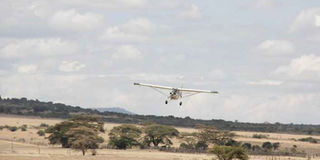Bill triggers call for probe into ranch leaders

Solio ranch in Nyeri. Members of ranches in areas such as Laikipia have demanded an audit of their officials. PHOTO | JOSEPH KANYI | NATION MEDIA GROUP
What you need to know:
- Calls have been made to oust the officials in line with the existing law that prescribes that membership lists be reviewed every five years.
- The Bill wants the registered land managed by a committee whose decisions are ratified by an assembly of the members.
With the proposed land law that seeks to guide managing of group ranches taking off, residents of Isiolo, Laikipia, Kajiado and Marsabit counties now want an audit of those who have been running the facilities.
They say dishonest officials have been pocketing incomes from the sale of resources on their land, selling plots behind their backs and committing their land to investors without involving them.
Calls have been made to oust the officials in line with the existing law that prescribes that membership lists be reviewed every five years.
The Community Land Bill, currently before Parliament, went through the second reading on Tuesday.
It is one of the proposed laws being fast-tracked to implement land reforms ahead of the 2017 elections. It originated from a task force formed by the Lands ministry in 2012.
“We dream of a time each member will earn something from the resources around us. For now, it is the preserve of a few,” said Ms Jennifer Nang’onye, a mother of eight from Dol dol, Laikipia County.
Mr George Saita, a member of the Rombo Group Ranch in Kajiado South, said: “We see telecommunication firms and cement makers setting up shop, yet members have never been called for consultations.”
Members have subdivided land and allocated it to themselves but with an almost disastrous outcome.
At Kimana Ranch in Kajiado, for example, more than 800 members were allocated 60 acres each. However, today, eight out of 10 members have sold more than half their land.
During a recent public meeting in Loitokitok, organised by a non-governmental organisation Act Change Transform, the subdivision of land was criticised.
A ranch member, Mr Jacob Moson, said: “Calls to subdivide the land are driven by lack of incomes among the joint owners. People prefer to get their pieces and sell them.”
OVERSIGHT AND GUIDANCE
There have been several other submissions at land forums in Isiolo, Laikipia, and Kajiado counties.
A complaint has been raised that some members were left out of original lists filed at land registries, and only a review of the membership can correct the injustice.
“We want new membership lists because some of those registered are now dead. Children of members must be included. Others were just left out due to ignorance,” said Mr Harrison Atey, a member of the Kuri Kuri Group Ranch in Laikipia.
Civil society groups have reservations on the powers the Bill gives the Cabinet Secretary over the registration of the ranches as societies.
The Bill wants the registered land managed by a committee whose decisions are ratified by an assembly of the members.
The groups say the problem of a few individuals getting all the income will still recur.
“Communities feel the registration in this manner will still breed a few beneficiaries,” said Mr Elmard Omollo, a land reforms manager at Act Change Transform.
Resources Conflict Institute (Reconcile) executive director Shadrack Omondi said a “mere committee” of locals without oversight and guidance of professionals would not bear much fruit for the larger community.




